|
|
|
Sort Order |
|
|
|
Items / Page
|
|
|
|
|
|
|
| Srl | Item |
| 1 |
ID:
114472
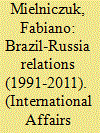

|
|
|
|
|
| Publication |
2012.
|
| Summary/Abstract |
CONSIDERING THE CONTINUITY between the Russian Empire, the Soviet Union and the Russian Federation, bilateral relations between Brazil and Russia exceed 180 years. However, a number of factors contributed for this relationship to remain incipient in most of its history - and the location of Brazil in a United States' zone of influence since its independence deserves special attention among them. In fact, the periods of lower intensity in relations with Moscow were those of greater animosity between the North American neighbor and the Soviet Union, as illustrated by the severance of diplomatic relations with the USSR in the beginning of the Cold War. In contrast, relations are restored in the context of the Independent Foreign Policy (1961) and start to intensify again in the 1970's, due to both the abandonment of the automatic alignment to the United States, adopted after the 1964 Coup, and the growing economic pragmatism of the military's foreign policy. However, even at those times the intensity of the relationship was moderate. In the late 1980's, with the end of the Cold War and the easing of tensions between the U.S. and the USSR, it could be expected a differential intensification of the relations between Brazil and Russia - the legal successor of the Soviet Union. Although there was an increase in bilateral relations since then, it is only after 2000 that the mechanisms built during the second half of the 1990's were implemented and bilateral relations reached their apogee, if compared to previous years.
|
|
|
|
|
|
|
|
|
|
|
|
|
|
|
|
| 2 |
ID:
114460


|
|
|
|
|
| Publication |
2012.
|
| Summary/Abstract |
THE PLACE OF THE BRICS in the system of global governance is determined by their growing impact on the world economy. To quote Jim O'Neill, who predicted the growth of the BRIC economies in 2001 : "All four of the BRIC countries have exceeded the expectations I had of them back in 2001. Looking back, those earliest predictions, shocking to some at the time, now seem rather conservative. The aggregate GDP has close to quadrupled since 2001, from around $3 trillion to between $11 and $12 trillion. The world economy has doubled in size since 2001, and a third of that growth has come from the BRICs. Their combined GDP increase was more than twice that of the United States and it was equivalent to the creation of another new Japan plus one Germany, or five United Kingdoms, in the space of a single decade. ... BRICs now account for probably close to 20pc of world trade compared with less than 10?c in 2001. Trade between the BRICs has risen far more quickly than global trade as a whole."1
|
|
|
|
|
|
|
|
|
|
|
|
|
|
|
|
| 3 |
ID:
114458
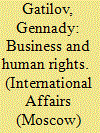

|
|
|
|
|
| Publication |
2012.
|
| Summary/Abstract |
IN AN INCREASINGLY GLOBALIZING WORLD, where we witness an interweaving of economic, financial, and trading ties, the issue of civilized behavior by transnational corporations is beginning to take on added urgency. The corporations are growing by absorbing ever more of the world's business and economic entities and active population. Their business activities span large groups of people, often becoming city-forming activities and, therefore, their scope of responsibility should include providing quality social and health services and maintaining a proper natural environment. In other words, the corporations are called upon to be a leader in labor relations and in the observance of labor laws and, accordingly, human rights. Of the 100 largest economies in the world, 51 are corporations; only 49 are countries.1
|
|
|
|
|
|
|
|
|
|
|
|
|
|
|
|
| 4 |
ID:
114461
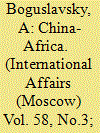

|
|
|
|
|
| Publication |
2012.
|
| Summary/Abstract |
THE OPENING of the 18th Summit of the heads of state of the African Union in Addis Ababa on January 28, 2012 was not quite ordinary. The leaders of African nations attended the cutting of the ribbon ceremony for a modern 100-meter long building of the African Union conference center in the Ethiopian capital built as a gift to Africa from "the government of China." In this connection, the press reported these impressive statistics: the total floor area of the complex is 100,000 square meters; the construction involved 1,200 Chinese and Ethiopian workers at a cost of $200 million to Beijing. The summit heard a lot of important words to the effect that the new complex was to become a symbol of African "revival," a victory over "Afro-pessimists" and a reflection of the continent's development potential in the years ahead.1 Undoubted, however, is also the fact that this gift from China sends a clear message to the international community that China's presence in Africa is in earnest and long-term.
|
|
|
|
|
|
|
|
|
|
|
|
|
|
|
|
| 5 |
ID:
114464


|
|
|
|
|
| Publication |
2012.
|
| Summary/Abstract |
Today there are no customs borders between Russia, Belarus and Kazakhstan. All forms of state border control have been abolished, except passport and visa controls at the Russia-Kazakhstan border. Such controls are still in place but it is no longer necessary to fill in customs declarations, to waste time and effort in order to overcome customs barriers. Sanitary, veterinary, phytosanitary and transport controls have been abolished, based on general rules, along with customs control. This helps to get rid of queues at the borders.
|
|
|
|
|
|
|
|
|
|
|
|
|
|
|
|
| 6 |
ID:
114467
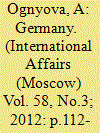

|
|
|
|
|
| Publication |
2012.
|
| Summary/Abstract |
"YOU CANNOT CREATE CULTURE with politics. Perhaps you can create politics with culture," first President of the FRG Theodor Heuss said at the height of the Cold War.1 Today, this is as true as ever: culture remains a powerful and efficient instrument of foreign policy; it can improve the state's image abroad, multiply its friends and contribute to its political projects.
|
|
|
|
|
|
|
|
|
|
|
|
|
|
|
|
| 7 |
ID:
114473
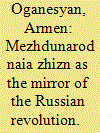

|
|
|
|
|
| Publication |
2012.
|
| Summary/Abstract |
Late in December 1921, the people's commissariats and other departments of Moscow and Petrograd were informed: "Subscription to the periodicals of the People's Commissariat for Foreign Affairs (NKID) is going on. The NKID Bulletin has been replaced with the Mezhdunarodnaia zhizn journal, a much wider publication in which N. Iordansky, M. Litvinov, I. Maysky, M. Pavlovich, K. Radek, and G Chicherin will be personally involved." This was obviously suggested by the new economic policy. The publishing department of NKID deemed it necessary to "inform all Soviet departments as well as Party and public structures that starting with January 1 free distribution of NKID publications will be discontinued... all organizations should subscribe to these editions well in advance." The circular quoted the prices: 2 rubles 65 kopeks in prewar rubles or $2.65 for subscribers abroad.
|
|
|
|
|
|
|
|
|
|
|
|
|
|
|
|
| 8 |
ID:
114474
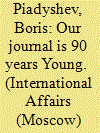

|
|
|
|
|
| Publication |
2012.
|
| Summary/Abstract |
IT ALL BEGAN in 1917 when many people came to develop the romantic notion that secrets in international affairs were no longer secrets and that diplomacy and politics should be an open book. It was then that Baltic Fleet Bolshevik sailor Nikolai Markin was instructed to organize the publication of secret treaties concluded by the preceding regimes. He arranged for the publication of several collections which historians later dubbed the "Markin Collections." The latter-day intellectuals Markin roped in to publish the documents thought it was a good idea to follow with publishing documents of the People's Commissariat of Foreign Affairs relevant not only to the past but also to current foreign policy affairs. In 1919, this resulted in the appearance of the Vestnik NKID (Herald of the People's Commissariat of Foreign Affairs of the RSFSR) which published diplomatic notes and other documents of the Commissariat along with articles by individual contributors.
|
|
|
|
|
|
|
|
|
|
|
|
|
|
|
|
| 9 |
ID:
114463
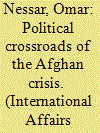

|
|
|
|
|
| Publication |
2012.
|
| Summary/Abstract |
ON DECEMBER 5, 2011, Bonn hosted the International Afghanistan Conference (the Second Bonn Conference) which attracted, according to the Afghan press, at least 90 countries and about 20 international and regional organizations,1 the figures Kabul assessed as a great achievement. The West confirmed its earlier intention to extend its aid to Afghanistan after 2014, the year of the final pull-out of the International Security Assistance Forces (ISAF) from the country. President of Afghanistan Hamid Karzai who chaired the conference promised to step up anticorruption struggle.
|
|
|
|
|
|
|
|
|
|
|
|
|
|
|
|
| 10 |
ID:
114469


|
|
|
|
|
| Publication |
2012.
|
| Summary/Abstract |
The Problems of Cooperation Among Civilizations and the Role of Non-State Actors in Contemporary International Relations
IN THE COMPLEX SYSTEM of international relations that we have now, it is important to identify objective factors whose influence is becoming a universal catalyst for the progress of the whole human race. The modern world processes call for a particular critical awareness of the parameters of global changes in society and of the challenges of ensuring the sustainability of social, economic and political development and engaging in a quest for mutually acceptable solutions.
|
|
|
|
|
|
|
|
|
|
|
|
|
|
|
|
| 11 |
ID:
114471
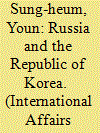

|
|
|
|
|
| Publication |
2012.
|
| Summary/Abstract |
WITH THE END OF THE COLD WAR and collapse of the bipolar system, Russian leaders reoriented national foreign policy towards cooperation with the West and other stable, moderate and economically strong states. The Republic of Korea (ROK) was assigned a place of no small importance among them as Moscow counted on South Korean loans and private investment in exchange for natural resources and space and military technologies. In parallel, since the 1990s humanitarian links between the two nations have strengthened considerably, aided by the fact that there is a Korean community of 600,000 on ex-Soviet territory.
|
|
|
|
|
|
|
|
|
|
|
|
|
|
|
|
| 12 |
ID:
114468
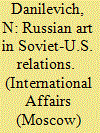

|
|
|
|
|
| Publication |
2012.
|
| Summary/Abstract |
ON AUGUST 26, 1936, the American press was abuzz with the news that William Bullitt, the first U.S. ambassador to Moscow, had returned to Washington before the end of his tenure. The New York World wrote that the critical situation in Europe required an experienced diplomat to serve as ambassador to the Soviet Union. The Baltimore Sun took up the refrain, stating that the appointment of a new ambassador was a serious problem, keeping in mind the role of Russia in European affairs and in light of America's traditional interests in the Pacific Ocean.
|
|
|
|
|
|
|
|
|
|
|
|
|
|
|
|
| 13 |
ID:
114465


|
|
|
|
|
| Publication |
2012.
|
| Summary/Abstract |
FUEL AND ENERGY COMPLEX is a key economic sector for the absolute majority of countries. It underpins, especially in terms of technology, the level of national security in economic, social and political aspects. Hence the special focus on assurance of energy security by the leaders of many states.
|
|
|
|
|
|
|
|
|
|
|
|
|
|
|
|
| 14 |
ID:
114462
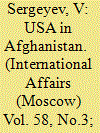

|
|
|
|
|
| Publication |
2012.
|
| Summary/Abstract |
LAST SPRING, U.S. President Barack Obama definitively decided to withdraw American troops from Afghanistan. According to his plan, out of the 102,000 servicemen currently stationed in Afghanistan, only 20,000-30,000 will remain in the country by late 2014 in order to carry out support and supply functions.1 Over 40,000 servicemen from Great Britain, Canada, Australia, and other U.S. allies will, most likely, be withdrawn entirely. Between 2010 and the first half of 2011, there were almost 150,000 soldiers from over 40 states in Afghanistan, yet this number did not suffice for victory. According to a study by the British Parliament, the Afghan central government and the troops of the international coalition control only a third of the country.2
|
|
|
|
|
|
|
|
|
|
|
|
|
|
|
|
| 15 |
ID:
114466


|
|
|
|
|
| Publication |
2012.
|
| Summary/Abstract |
THE ATTAINMENT of national independence by Uzbekistan and its international recognition mean that Uzbekistan will now pursue an independent domestic and foreign policy and establish mutually beneficial relations without any intermediaries. At the same time, on the road to real economic independence the country still has to overcome a number of objective difficulties and solve a whole range of problems inherited from the socialist system.
|
|
|
|
|
|
|
|
|
|
|
|
|
|
|
|
| 16 |
ID:
114470
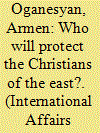

|
|
|
|
|
| Publication |
2012.
|
| Summary/Abstract |
OVER THE PAST SEVEN YEARS, the number of physical reprisals and terrorist acts against Christians in Africa, Asia, and the Middle East has increased by 309%.
The Arab Spring has added momentum to this process, causing it to snowball. By the end of last year, 200,000 Copts had left their homes to escape the repressions of the new Egyptian authorities. Notwithstanding the NATO contingents deployed in the country, the reprisals aimed against Christians in Iraq have reduced their numbers from one million to less than 500,000. According to UN data, in South Sudan, in spite of the world community's intermediation, between 53,000 and 75,000 people have been forced to leave their historical place of residence. Furthermore, they, like thousands of other Christian refugees from the East, have little chance of returning - their homes are being torn down and plundered.
|
|
|
|
|
|
|
|
|
|
|
|
|
|
|
|
| 17 |
ID:
114459


|
|
|
|
|
| Publication |
2012.
|
| Summary/Abstract |
TROUBLED TIMES have come to the Middle East and North Africa. The stability, albeit fragile, of the entire region and its neighboring countries is put in jeopardy. It looks as though the right to life of the millions of Arabs and Persians doesn't exist. The United Nations has been pushed aside; its potential in the field of security isn't being properly utilized.
It surprises nobody anymore that power politics once again crushes diplomacy and the power of law. People have got used to that. All are asking themselves the same question: After Yugoslavia, Iraq, and Libya, who will be next? And when will this militaristic orgy finally end? Why is it so that no one can stop it?
|
|
|
|
|
|
|
|
|
|
|
|
|
|
|
|
|
|
|
|
|